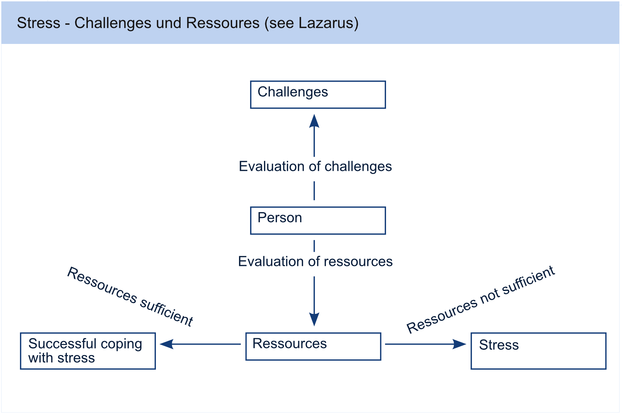A large number of surveys show that cases of burnout and severe stress reactions are overrepresented within the caring and social professions, such as physicians, nurses and teachers. Even though this fact is known for a long time only a few or no countermeasures were taken on the administrative or organizational level. Therefore, each professional has to find his or her own ways to cope with stress and prevent a burnout. The first step is to understand the causes and roots of these phenomena which are explained in this article through the two main factors.

Burnout in Caring and Social Professions
by godbersen
Burnout and stress are overrepresented in caring and social professions. This article explains the reasons and points out why the personal prevention is the only way.
The Stress Factor: An Imbalance of Challenges and Resources
Stress is commonly known. Not only caring or social professionals face time pressure, an increasing workload and difficult tasks. A short period full of stress is usually not problematic if a calmer and more relaxing time follows. However, if the pressure continues it can cause severe stress reactions on the physical, mental and social level. Some of the consequences of stress can be a myocardial infarction, depressions and social isolation.
A proven explanation of stress which is more than just a description of symptoms is provided by stress model of Lazarus. A person compares the challenges of a situation with the his or her physical and mental recourses. If the resources are not sufficient to cope with the situation the person experiences stress which is an unpleasant or painful feeling of facing an uncontrollable threat.
Because theses challenges or stressors have intensified during the recent years and decades caring and social professionals have to develop effective strategies of coping with stress. The three main directions of a sound stress management might help to design a personal strategy.
The first option is to reduce the stressor. This could be quite difficult for a caring or social professional. For example, a physician or nurse cannot simply send a patient who needs help away. However, there might be an opportunity to optimize processes on the organizational level which could be initiate by a caring and social professional at the “front line”.
The second approach to improve the ability to cope with stress is strengthening one’s own recourses. This refers to the individual processes in work and the level of personal skills. Often, the time investment in an advanced education course will pay off very quickly through the increased efficiency in daily routines.
The third aspect of an effective stress management does not aim to solve the causes of stress like the two approaches mentioned before. The goal can be described as strengthening the energy reserve which is necessary to successfully cope with stress. Amongst a balanced lifestyle which integrates all of the areas of life relaxation techniques and other similar methods can be of help.
The Burnout Factor: An Imbalance of Engagement and Rewards
To only explain burnout through stress would not be sufficient. There are other professions that face physical and mental stress but do not have the same burnout rates. Therefore, there must be a second factor which makes burnouts more likely in caring and social professions. This factor is the high involvement of physicians, nurses, teachers… Normally, a person who suffers from a burnout has shown a high identification with his or her job.
At this point it should be clearly stated that the high identifications with one’s job in the caring and social profession and with it the important contribution to society are very honorable. However, it can become dangerous if personal engagement is not followed by acceptance and acknowledgement.
This should be clarified by an example of the profession of teachers. Very often, the educational system and the schools are blamed for the large number of (socially) failing students. In this context the public forgets that young people are not only socialized in school but also by their families and peer groups. This effect gets even worse when the a teacher sees the failure of a student as his or her own failure. The same principle applies to nearly all of the caring and social professions. Even the socially highly acknowledged physicians can face this problem. As long as all of the prescribed treatments go well there everyone is happy; but if something goes wrong the physician is the first to be blamed even if he or she did nothing wrong.
To prevent the described mismatch of engagement on one hand and acceptance and acknowledgement on the other a caring or social professional should reflect on his or her work and life values. As mentioned earlier, taking responsibility for others is a very good attitude and should not be given up. However, it is strongly advised to realize the other values and areas of life which are important for the overall self-contentment. As a side-effect, a sound life balance will also give a stronger basis for the performance at work. Furthermore, it makes sense to accept the limitations of the own abilities and the fact that nobody can achieve everything just on his or her own. This attitude will also help to put exceeded expectations or unjustified external criticism into perspective.
Burnout Prevention: Self-Initiative is Key
Finally, it should be mentioned that statistics and describing reports can point out the threat of a burnout for caring and social professions; but they cannot help an affected person. Like a good teacher tells his/her students and a good physician advises his/her patients to show self-responsibility a caring and social professional has to take the initiative to effectively cope with stress and actively prevent a burnout.
You might also like
Mindfulness-Based Stress ReductionLearn how to reduce stress with mindfulness meditation exercises.
Take Some Time For TeaBecome a teaist and start dedicating the ritual of tea brewing as a brief per...




 Stop Smoking with the Cognitive and Behavioral Therapyon 05/20/2013
Stop Smoking with the Cognitive and Behavioral Therapyon 05/20/2013
 What to Do When We Lose Our Freedom: The Principle of Reactance:on 05/20/2013
What to Do When We Lose Our Freedom: The Principle of Reactance:on 05/20/2013
 Fundamentals of Financial Analysis and Planning for Private Householdson 04/10/2013
Fundamentals of Financial Analysis and Planning for Private Householdson 04/10/2013
 The Seven Aspects of Assertive Communicationon 04/03/2013
The Seven Aspects of Assertive Communicationon 04/03/2013


Comments